Open Sesame! Translators Unlock Words and Worlds
But Do They Sometimes Steer Us Wrong? Can We Know? How Much Does It Matter?
I walk into my library and pull down books by authors I love: Mario Vargas Llosa, Eugene Vodolazkin, Yoko Ogawa, Alessandro Manzoni, Sigrid Undset, Clarice Lispector, Shusaku Endo, Mikhail Bulgakov, Yan Lianke, others besides. One thing all these novelists have in common? They write in languages besides English. My access to their work comes through the work of others: translators.
That’s true for nonfiction as well. When I flip to the title page of Johannes Fried’s magisterial biography, Charlemagne, I notice that it’s translated by Peter Lewis. When I pick up my copy of Montaigne’s Essays, I see it’s translated by Donald Frame; I’ve also enjoyed M.A. Screech’s and bits of John Florio’s. Same with Irene Vallejo’s beautiful history of books, Papyrus, translated by Charlotte Whittle, and Carlo Rovelli’s fascinating study Anaximander, translated by Marion Lignana Rosenberg.
I owe thanks to them all. I can read just fine. But I can’t read Russian, French, Chinese, Spanish, Italian, German, Japanese, Latin, Greek, Syriac, or Hebrew. It’s a big world out there, but much of it is dark to me without translation.
In Other Words
At its most basic, translation makes words intelligible in one language intelligible in another. We’re a long way since Babel, and there are as many as 7,000 languages spoken in the world today. No way I’m sorting that out on my own; I can barely manage a Spanish menu, and I know just enough Italian and French to order the wrong thing. But to depend on others to help us make sense of the world requires us to depend upon their judgments about how to make all those words intelligible—and even what it means to do so in the first place.
I’ve loved Eugene Vodolazkin’s novels since I first read Laurus however many years ago. I’ve read some of his newspaper articles in Russian, courtesy of Google Translate, but for his books I’m in the reliable hands of Lisa C. Hayden. How do I know she’s reliable? I don’t, really. I’ve had many exchanges on Twitter/X with her over the years, and interviewed her back in 2023. That’s far more connection than I have with most translators I rely on.
I know from her own reports that she works closely with Vodolazkin; he apparently trusts her. Why shouldn’t I? But, then again, how much does that actually matter? After all, I’m not actually reading Vodolazkin; I’m reading Lisa’s Vodolazkin, and that’s what I’ve come to love. The same is true for every novel I’ve read in translation.
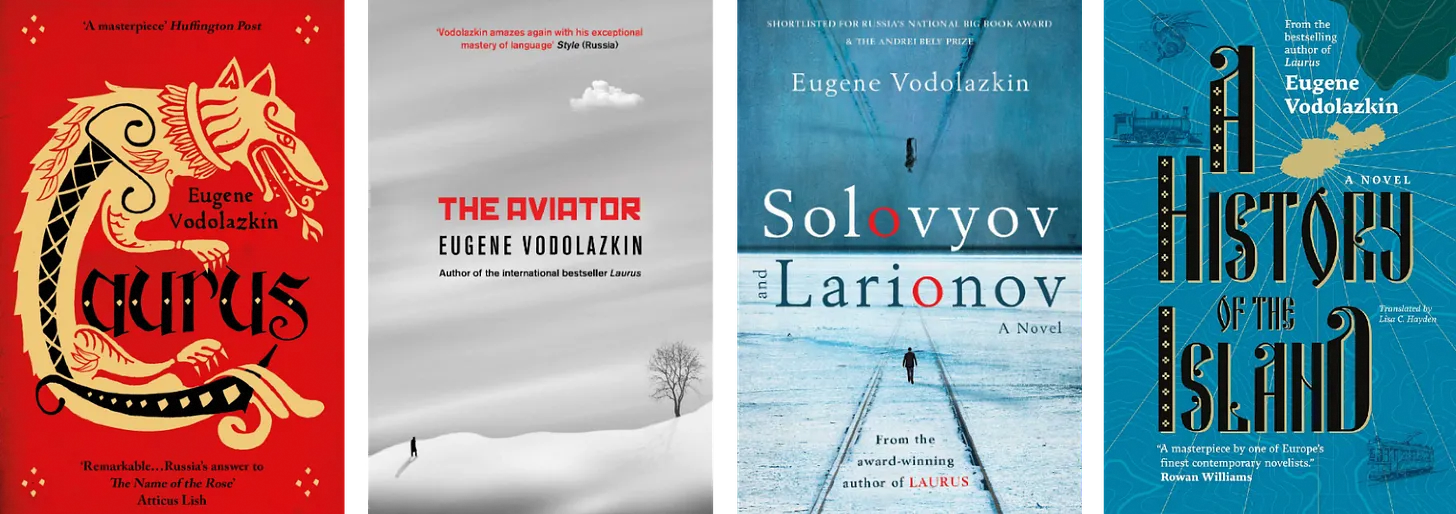
Shusaku Endo’s The Samurai stands among my favorites. It was translated by Van C. Gessel, who has translated several of Endo’s books. In his preface, Gessel mentions that Endo referred to translation as transformation. “A piece of literature,” explains Gessel, “that is forcibly uprooted from its natural environment and thrust into strange surroundings will of necessity go through some painful but necessary changes.”
While Gessel says his “foremost concern has been to preserve the integrity of Mr. Endo’s original work,” he admits having to make some alterations to the text. “With Mr Endo’s permission, I have made a very small number of excisions in the text. These cuts have never been deep enough to draw blood, and if the reader could examine each wound carefully he would, I think, be grateful rather than incensed that minor elective surgery was performed.”
He goes on to explain the nature of his cuts, mainly tightening some of Endo’s prose and eliminating redundancies, “an acceptable literary device in Japan” that “would doubtless only irritate and alienate the Western reader.” But Gessel quickly adds, “Only those who can read the original will be able to verify that I have done no perceptible harm to the novel. . . .”
And for the rest of us? “All others will have to accept my assurance that I have had only the best interests of my friend Shusaku Endo in mind.” In other words, Trust me. Gessel offers a subtle emotional nudge to his appeal by calling Endo his friend, but I suppose we have to take his word for that as well.
I bring up the case of Endo and Gessel in particular because I recently read an article about his novel Scandal that takes aim at Gessel’s translation. “Gessel . . . has given readers a self-conscious English version which at times borders on the laughable,” says the critic, offering a couple of examples: “‘When the meal was served, Madame Naruse plied her fingers with chopsticks meticulously, and she dined with agreeable gusto’ (p. 87); an unborn baby is described as staying ‘peacefully somnambulent’ within its mother’s womb (p. 253).”
On their face, both of those formulations seem wooden and graceless. (Scandal still sits amid my TBR, alas.) But is that Endo or Gessel? I don’t read Japanese, so how am I to say? I do know from his own writing that Gessel can be clumsy—for instance, just look above: “will of necessity go through some painful but necessary changes”? That prepositional “of necessity” should count as an unforced error; it’s unnecessary.
That said, I’ve run into similarly clunky moments in Endo’s work and have never found them detracting from the overall effect. What can I say except I’m grateful for every word of Endo’s that Gessel has given me, transformed however-which-way? I’m not going to begrudge a splash of spilt wine when a man has served me a feast.
Different philosophies and approaches, whether conscious or not, affect translators’ work. Some work better than others—and some work in some cases and not others. I’ve never read a translator say they were trying to do the author one better; when confessing their motives, they all usually talk about staying true to the original while making whatever accommodations might be necessary to bridge the linguistic divide. But, of course, that sits somewhere on a sliding scale, and some translators slide right off the meter.
The Wrong Song?
John Florio’s translation of Montaigne’s Essays regularly elaborates and extends the original, so much so it stretches any justification. One example: Where Montaigne says, “Every little dabbler, for aught I see, swells his words as high,” Florio gives us “I see not one of these petty-ballad-makers, or prentise-dogrell rymers that doth not bumbast his labors with high swelling and heaven-disimbowelling words.” Flamboyance is par for the course in Florio’s translation, as this thread nicely shows.
Maybe we can excuse such excesses since Florio was Elizabethan; something in the air! But modern translations can easily veer too far as well. Take the case of Swedish novelist Stieg Larsson’s The Girl with the Dragon Tattoo series, which have sold over 100 million copies in various languages.
English provides the tricky case study. Larsson had written three novels in the series—out of ten projected—but then died of a stroke. Very inconvenient. His Swedish publisher thought they had something special, or at least an asset they hoped to maximize, and sought an English publisher. Nobody wanted it. “The book was such a mess it could not be fixed,” one U.S. publisher said.
Eventually, the UK publisher MacLehose Press picked up the contract. They started by changing the title of the original book and the third in the series to have more shelf appeal. But they didn’t stop there, and Larsson was dead, so what did he care? Furthermore, what could he do?
“If you had the author,” explained publisher Christopher MacLehose, “you would make suggestions. We didn’t have the author but that shouldn’t stop you making the sentences more interesting for the reader.” With a sentiment like that—and can you blame him? he’s a commercial publisher, after all—you already know what’s coming.
The original translator Steven T. Murray so disapproved of MacLehose’s changes he insisted his translator’s credit be listed under a pseudonym. “I wasn't given enough time to go over the final editing, and I also didn’t agree with many of the changes that had been made,” he said. “I didn’t want to be blamed for such things.” The final effect of the edits changed the feel of the novels, the vibe of the main character, and deviated from Larsson’s original intent—not that most of those millions of readers knew or cared.
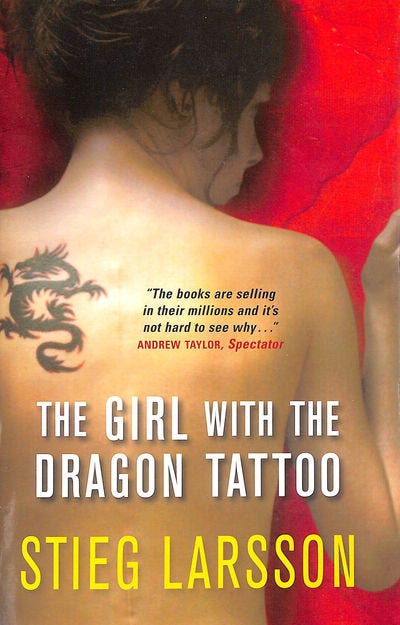
The case of Bram Stoker’s Dracula is even wilder. The Icelandic translator so transformed the book, he birthed another creature entirely—and nobody even noticed until the Dutch scholar Hans Corneel de Roos uncovered the truth over a century later. Stoker’s original came out in 1897 to mass fame. A few years later Valdimar Asmundsson reworked the story as Makt Myrkranna (Powers of Darkness) with Stoker himself seemingly providing a foreword. But the story itself?
Asmundsson changed the names of characters, condensed some sections and expanded others, upped the sensuality and titillation, and altered more besides. He radically streamlined the pacing, structure, and length. Stoker’s original stands at over 150,000 words. Makt Myrkranna is not quite 50,000. A slightly earlier Swedish version doubled the original word count, yet Asmundsson seems to have been working not from Stoker’s original at all but from another Swedish version that abridged the original by a third; the identity of the Swedish translator(s) remains unknown. And Stoker’s foreword? Likely forged. And yet this mess passed for Stoker’s Dracula in Iceland for more than a hundred years.
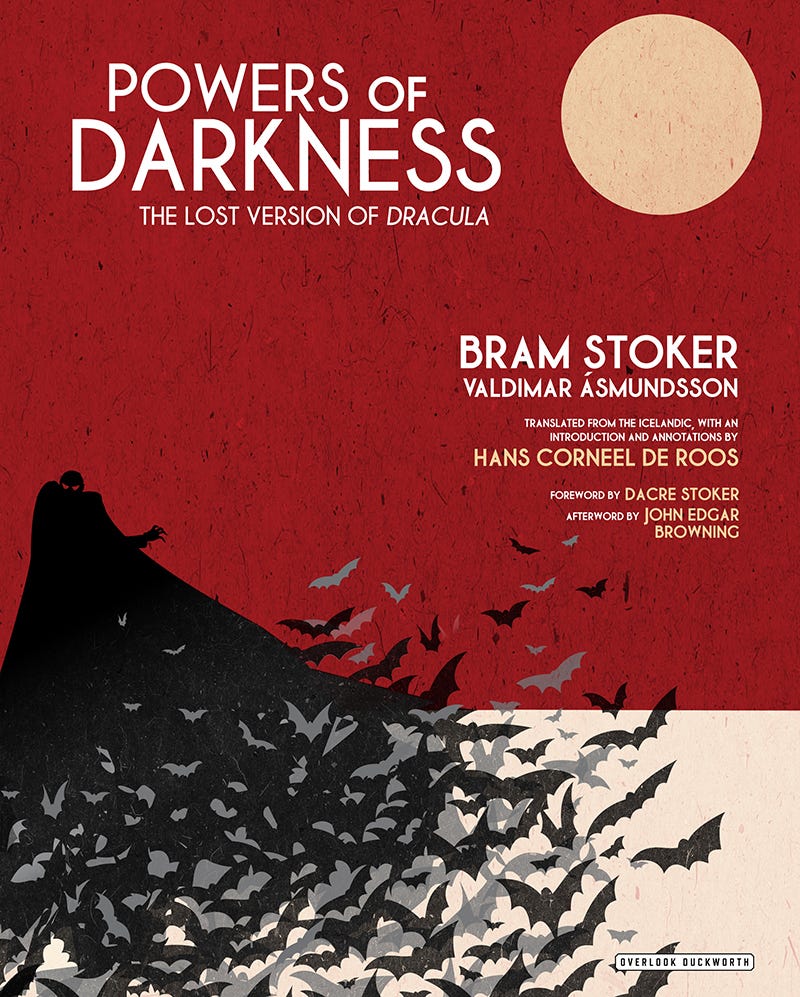
But was it a mess? De Roos says it might be a better book. “What I eventually discovered turned out to be a story more exciting and elegant than Dracula itself,” he says. “Yes, I said it. . . . The original novel can be tedious and meandering. . . . Powers of Darkness, by contrast, is written in a concise, punchy style; each scene adds to the progress of the plot.”
I used to have a copy of Rubaiyat of Omar Khayyam, translated by Edward FitzGerald, given to me by Grandpa Olson. In the decades since, I’ve somehow lost it. Famed translator Richard Pevear points to FitzGerald’s version as a “notorious example” of a translator veering from the original and creating something singularly good despite the deviation. Robert Graves followed with a more accurate translation but, says Pevear, it’s “worthless and dull. And then you go back to FitzGerald and it sings. It sings the wrong song, but it sings. These are some of the ironies of translation.”
Literary License (to Kill)
All of this raises the question of what translators owe their authors and readers: accessibility, accuracy, flexibility, fidelity, what? It’s not easily answered. When Jerome first unleashed his new Latin translation, congregants in one Libyan city threw a conniption over one word choice in one book. Augustine wrote Jerome about the situation:
A certain bishop, one of our brethren, having introduced in the church over which he presides the reading of your version, came upon a word in the book of the prophet Jonah, of which you have given a very different rendering from that which had been of old familiar to the senses and memory of all the worshippers. . . .
The change caused “such a tumult,” Augustine explained, the bishop “was compelled to correct your version . . . as if it had been falsely translated, as he desired not to be left without a congregation—a calamity which he narrowly escaped.” We might be surprised that people would fight over a mistranslated word, but who are we kidding? We still do.
Translators have very strong opinions about what they do, and they don’t always approve of each other’s work—same with specialists and critics who feel the moral burden of publicly responding to efforts they dislike. Vladimir Nabokov and Edmund Wilson exploded their longstanding friendship over Nabokov’s translation of Pushkin’s novel-in-verse Eugene Onegin. As Wilson explained in the New York Review of Books, he found Nabokov’s version “bald and awkward,” “uneven,” “sometimes banal,” “vulgar,” “clumsy,” “flattening,” and “tortur[ous],” not to mention other faults.
In response, Nabokov mocked his (former) friend’s secondhand knowledge of Russian. “Upon being challenged to read Eugene Onegin aloud,” said Nabokov, Wilson “started to do this with great gusto, garbling every second word and turning Pushkin’s iambic line into a kind of spastic anapest with a lot of jaw-twisting haws and rather endearing little barks that utterly jumbled the rhythm and soon had us both in stitches.” As the theater saying goes, leave no turn unstoned.

Wilson came to regret his part of the tiff, but Nabokov proved inflexible. Based on the account by David Remnick, it seems the pair never reconciled. Nabokov’s inflexibility owes not only to the public embarrassment caused by Wilson’s critique but his own philosophy of translation. “A schoolboy’s boner is less of a mockery in regard to the ancient masterpiece than its commercial interpretation or poetization,” he said. “The term ‘free translation’ smacks of knavery and tyranny. . . . The clumsiest literal translation is a thousand times more useful than the prettiest paraphrase.” Yeah, but no.
The Never-ending Argument
Hauling a text over the chasm of indecipherability—sometimes from one entirely different language family to another—requires a million decisions related to syntax, vocabulary, tone, verve, register, rhythm, connotation, cohesion, rhetorical effect, and whatever else. But no absolutely “correct” answers exist to any of these; it all comes down to judgement, taste, and conviction.
Richard Pevear and his wife Larissa Volokhonsky, have made an entire career by translating the greats of Russian literature—most recently Foolsburg by Mikhail Saltykov-Shchedrin. The classic satire is little known in English, arguably because the only previous English translation failed the original, which the New York Times described as “insistently literal.” By “accurately” rendering the prose, the translator created an inaccurate perception of the book, completely missing the humor and wordplay of the Russian. Pevear and Volokhonsky’s effort restores the humor—and makes the book seem both fresh and relevant in today’s politics.
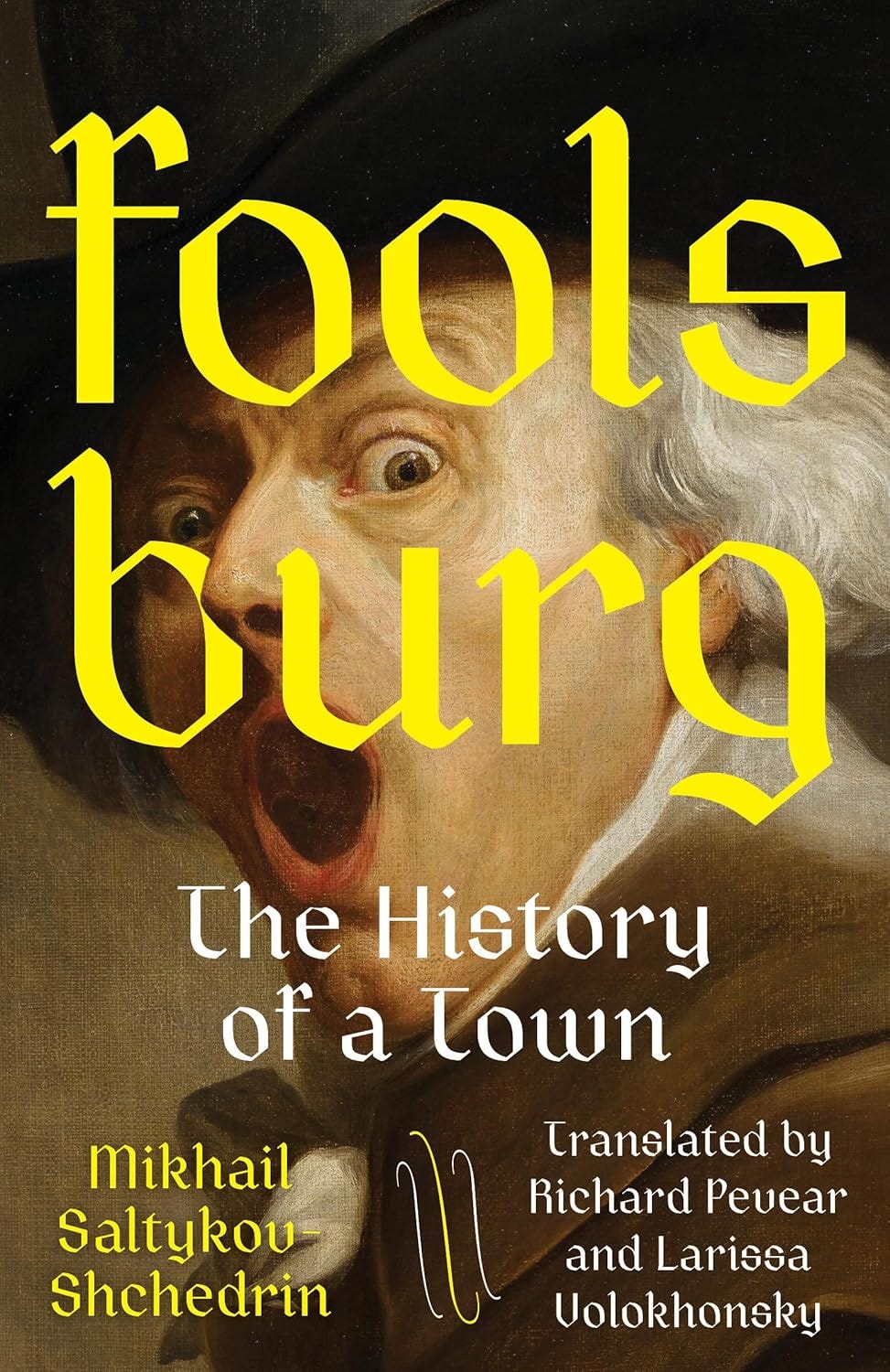
Restoring lost humor prompted their whole career, as it happens. Pevear and Volokhonsky found existing translations of The Brothers Karamazov missed the mark, especially by robbing Dostoevsky of his humor. “The jokes, or the unusualness, just disappeared,” explains Volokhonsky of one version. “The meaning is there, but the style, the tone, the humor are gone.” So they jumped on the translation train and never looked back.
Pevear and Volokhonsky claim to be more accurate than other translators, and their method reflects as much. In fact, they’ve hanged their reputation on their commitment to word-for-word literalness. But I earlier cited Pevear’s statement about FitzGerald’s Rubaiyat—“It sings the wrong song”—precisely because it’s something critics have leveled at Pevear and Volokhonsky’s many translations.
Gary Saul Morson has compared the mighty edifice of their work—dozens of books at this point—to phony Potemkin villages: “apparently definitive but actually flat and fake on closer inspection.” Pevear and Volokhonsky’s “attempt at unprecedented fidelity is a word-for-word, syntax-for-syntax version that sacrifices tone and misconstrues overall sense.” And Morson’s got the receipts to press his case, citing example after example where Pevear and Volokhonsky miss the mark—according to him.
For what it’s worth, I believe Morson. But let’s be honest: My belief isn’t worth much. If I’m not qualified to pass judgment on Pevear and Volokhonsky’s translation (my Russian is every bit as terrible as my Japanese), what makes me qualified to pass judgment on Morson’s critique of it? I don’t have the tools. All I brought to this gunfight is a spoon. I’m just going to have to take someone’s word for it—and since nobody agrees, that leaves me what option?
Part of the problem with the intractability of these never-ending debates is we’ve misjudged the stakes. We need to dial back the expectations we’re throwing at translation. No translation is perfect. Most are valuable. All are provisional and, to one degree or another, personal. There’s no such thing as a definitive translation; it’s an oxymoron. Textual absolutism is alien to literature and language itself. And that’s just fine because nobody’s life is on the line here. People aren’t bleeding out because Gessel (may or may not) have given us a wonky phrase or two. Neither children nor pets are dying because Pevear and Volokhonsky think their translations are funny when they’re actually (maybe) stodgy.
If we lower the stakes (and let me back up and say that goes for the value of the underlying books themselves; if Dostoevsky is as great as we say, his reputation and legacy can weather an underwhelming translation), we might find more freedom to read for enjoyment and edification rather than suffer under the delusion that we’re not getting the “right” experience of a book unless we’re reading the “best possible” translation. No such thing exists.
“To understand translation in a way that matters,” says Lawrence Venuti, “we need to think of it as endless interpretation, endlessly variable, endlessly innovative.” I don’t think there’s any other possibility.
Thanks for reading! If you enjoyed this post, please hit the ❤️ below and share it with a friend.
More remarkable reading is on its way. Don’t miss out. Subscribe for free today.




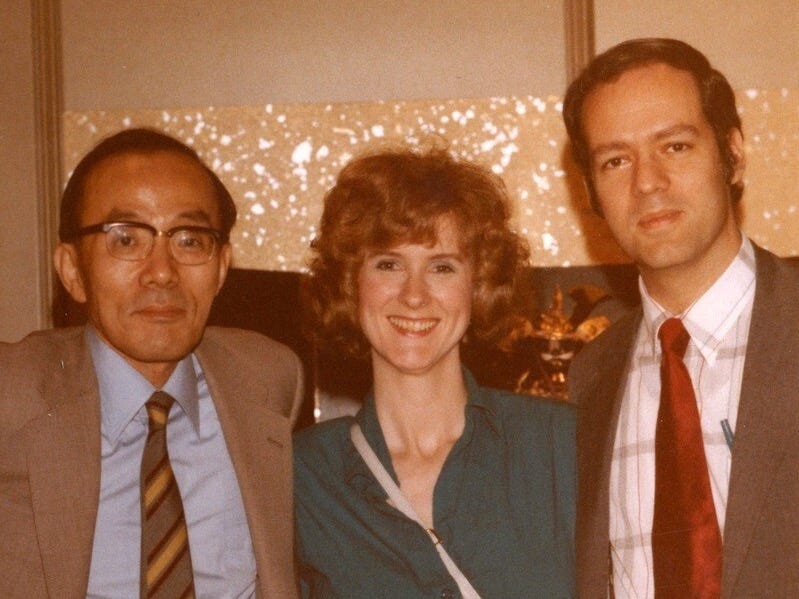

Well, I'm just glad Jesus spoke in King James English.
As AI read this, I recalled these words from the preface to the King James Bible, 'From the Translators to the Reader':
"The King's speech, which he uttereth in Parliament, being translated into French, Dutch, Italian, and Latin, is still the King's speech, though it be not interpreted by every Translator with the like grace, nor peradventure so fitly for phrase, nor so expressly for sense, everywhere."